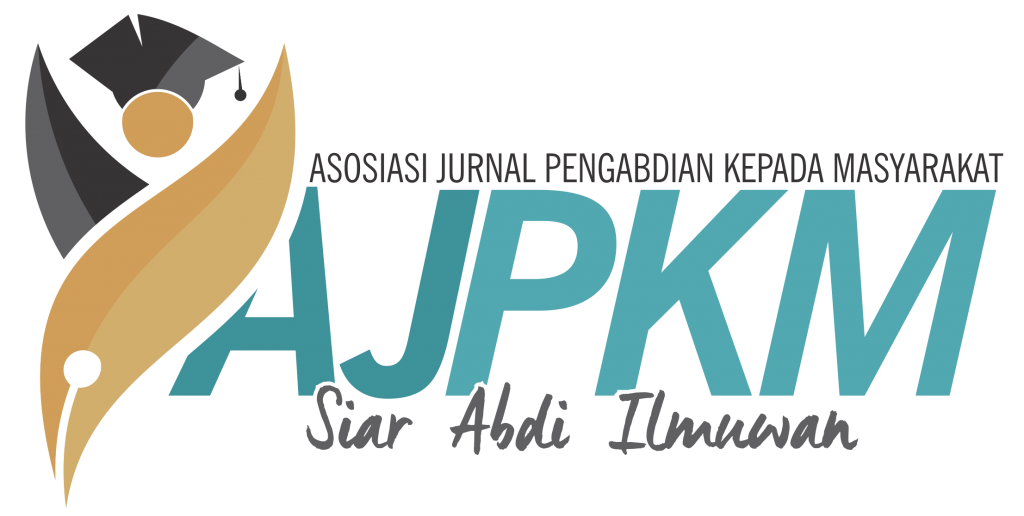SOSIALISASI PENERAPAN KAJIAN BIOTEKNOLOGI DALAM INDUSTRI PANGAN DAN PELATIHAN PEMBUATAN PRODUK BIOTEKNOLOGI DI MADRASAH ALIYAH AL-JIHAD PONTIANAK
Abstrak
Throughout the ages, humans have processed and produced food and beverages by applying the principles of biotechnology. In Indonesia, foods produced through biotechnology—such as tempeh and bread—are commonly found across different segments of society. However, due to a lack of information, many people remain unaware that these foods and drinks are the result of conventional biotechnology processes. Therefore, the aim of this activity was to introduce biotechnology and its role in the food industry, as well as to train students of Madrasah Aliyah Al-Jihad Pontianak in producing biotechnology-based products such as bread and tempeh. This activity was divided into two stages: the preparation stage and the implementation stage. During the implementation stage of the community service program, three main activities were carried out: first, a presentation of the socialization materials; second, hands-on training in making bread and tempeh; and third, the evaluation process. Monitoring and evaluation of the activity outcomes were conducted using questionnaires. Based on the results of the pre-test and post-test, it was found that there was an 83% increase in knowledge among female students at Al-Jihad regarding biotechnology-based food products.
Sejak ribuan tahun lalu, manusia telah mengolah dan menghasilkan makanan dan minumannya dengan menerapkan prinsip bioteknologi. Di indonesia, berbagai macam makanan yang merupakan produk bioteknologi dapat dengan mudah dijumpai pada berbagai kalangan masyarakat seperti tempe dan roti. Masih banyak yang tidak mengetahui bahwa makanan dan minuman tersebut merupakan produk yang dihasilkan dari proses bioteknologi karena kurangnya informasi. Oleh karena itu pengabdian kepada masyarakat ini dilakukan dengan tujuan untuk mengenalkan kajian ilmu bioteknologi dan peranannya dalam industri pangan serta melatih siswa Madrasah Aliyah Al-Jihad Pontianak dalam menghasilkan produk bioteknologi seperti roti dan tempe. Kegiatan ini dibagi menjadi menjadi dua tahapan yaitu tahap persiapan dan tahap pelaksanaan kegiatan. Dalam tahap pelaksanaan PKM dilakukan 3 rangkaian kegiatan yaitu tahapan pemaparan materi sosialisasi, tahapan kedua adalah pelaksanaan pelatihan pembuatan roti dan tempe, dan tahapan terakhir adalah proses evaluasi. Monitoring evaluasi hasil kegiatan dilakukan melalui pengisian kuesioner. Berdasarkan hasil pre-test dan post didapatkan hasil bahwa terjadi peningkatan pengetahuan sebesar 83% di kalangan santri Al-Jihad putri mengenai produk pangan berbasis bioteknologi.
Kata Kunci
Teks Lengkap:
PDFReferensi
Barnett, J. A. (2000). A history of research on yeasts 2: Louis Pasteur and his contemporaries, 1850-1880. Yeast (Chichester, England), 16(8), 755–771. https://doi.org/10.1002/1097-0061(20000615)16:8<755::AID-YEA587>3.0.CO;2-4
Cavalieri, D., McGovern, P. E., Hartl, D. L., Mortimer, R., & Polsinelli, M. (2003). Evidence for S. cerevisiae fermentation in ancient wine. Journal of Molecular Evolution, 57 Suppl 1, S226-32. https://doi.org/10.1007/s00239-003-0031-2
Hassaan, G. A. (2017). Mechanical Engineering in Ancient Egypt , Part 54 : Bread , Beer , Wine and Perfume Industries. International Journal of Emerging Engineering Research and Technology, 5(6), 1–13.
Lahue, C., Madden, A. A., Dunn, R. R., & Smukowski Heil, C. (2020). History and Domestication of Saccharomyces cerevisiae in Bread Baking. Frontiers in Genetics, 11, 584718. https://doi.org/10.3389/fgene.2020.584718
Mcgovern, P. E., Zhang, J., Tang, J., Zhang, Z., Hall, G. R., Moreau, R. A., Butrym, E. D., Richards, M. P., Wang, C., Cheng, G., Zhao, Z., & Wang, C. (2004). Fermented beverages of pre- and proto-historic China. PNAS, 101(51), 17593–17598. https://doi.org/10.1073/pnas.0407921102
Musa Maryam, B. (2017). The Role of Biotechnology in Food Production and Processing. Engineering and Applied Sciences, 2(6), 113. https://doi.org/10.11648/j.eas.20170206.14
Pramashinta, A., Riska, L., Hadiyanto, Maharani, L., Punaji, S., Saida, U., Anantyarta, P., Sari, R. L. I., & Utama, A. (2017). Review Bioteknologi Pangan: Sejarah, Manfaat dan Potensi Risiko. Jurnal Biologi Dan Pembelajaran Biologi, 2(2), 58–68. http://jurnal.unmuhjember.ac.id/index.php/BIOMA/article/view/821
Sriherwanto, C. (2021). Recent potential biotechnological applications of the tempeh mould Rhizopus. A short review. IOP Conference Series: Earth and Environmental Science, 759(1). https://doi.org/10.1088/1755-1315/759/1/012066
Struyf, N., Van der Maelen, E., Hemdane, S., Verspreet, J., Verstrepen, K. J., & Courtin, C. M. (2017). Bread Dough and Baker’s Yeast: An Uplifting Synergy. Comprehensive Reviews in Food Science and Food Safety, 16(5), 850–867. https://doi.org/10.1111/1541-4337.12282
Wang, J., Liu, L., Ball, T., Yu, L., Li, Y., & Xing, F. (2016). Revealing a 5,000-y-old beer recipe in China. PNAS, 113(23), 6444–6448. https://doi.org/10.1073/pnas.1601465113
Zain, M. Z. M., Shori, A. B., & Baba, A. S. (2022). Potential functional food ingredients in bread and their health benefits. Biointerface Research in Applied Chemistry, 12(5), 6533–6542. https://doi.org/10.33263/BRIAC125.65336542
Zarzycki, P., Wirkijowska, A., Teterycz, D., & Łysakowska, P. (2024). Innovations in Wheat Bread: Using Food Industry By-Products for Better Quality and Nutrition. In Applied Sciences (Vol. 14, Issue 10). https://doi.org/10.3390/app14103976
DOI: https://doi.org/10.24198/kumawula.v8i1.56824
Refbacks
- Saat ini tidak ada refbacks.
Kumawula: Jurnal Pengabdian kepada Masyarakat Terindeks Di:











21.png)













